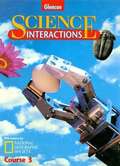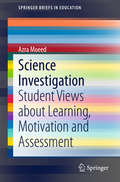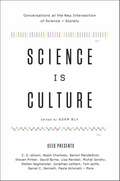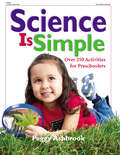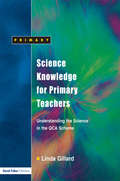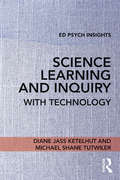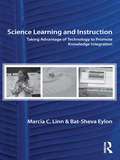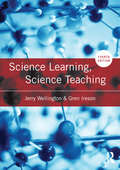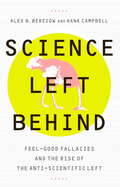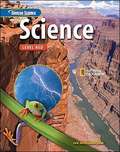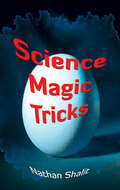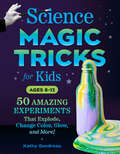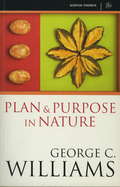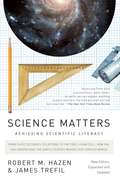- Table View
- List View
Science Insights: Exploring Earth and Space
by Michael Anthony Dispezio Gerald Skoog Bobbie Sparks Marilyn Linner-Luebe Marilyn LisowskiReading a science textbook is not like reading a magazine or a story. You usually don't have to work hard to understand a story. You probably won't remember it for a long time, either. But when you read science, you are reading to learn something new. You will need to think about what you read. You will also need to remember as much as you can. You may just read a story, but you will need to study your textbook.
Science Insights: Exploring Living Things
by Michael Dispezio Marylin Lisowski Gerald Skoog Bobbie Sparks Marilyn Linner-LuebeA science book that covers cells, heredity, evolution, classification, simple organisms, plant life, animal life, human life and ecology.
Science Insights: Exploring Matter and Energy
by Michael Dispezio Marylin Lisowski Gerald Skoog Bobbie Sparks Marilyn Linner-LuebeThe textbook explores such aspects of matter and energy as heat, electricity, and nuclear chemistry, with suggested activities and review questions at the end of each chapter.
Science Interactions, Course 4
by Robert W. Avakian Daniel J. Blaustein Charles W. Mclaughlin Kevin Reel Marilyn S. Thompson Julie Iris Wulff Paul ZitzewitzDo you always assume there's someone "out there" who will find solutions for problems our world faces? What if that someone is you? This introduction will tell you about tools you can use to solve problems and make discoveries about our world.
Science Interactions: Course 1
by McGraw-HillReflection and refraction are responsible for many of the colorful effects we see around us. Some, such as rainbows, are rare enough to be a new delight each time we see one.
Science Interactions: Course 2
by Edward Ortleb Ralph M. Feather Susan Snyder Paul Zitzewitz Bill Aldridge Russell Aiuto Jack Ballinger Anne Barefoot Linda Crow Albert Kaskel Craig KramerScience textbook with topics: forces, pressure, energy, earth materials, resources, air, etc.
Science Interactions: Course 3
by McGraw-HillThis book covers science under the following units: electricity & magnetism, atoms & molecules, our environment, changes in life & earth over time and observing the world around you.
Science Investigation
by Azra MoeedThis book reports the findings of an interpretive case study of the phenomenon of science investigation (science inquiry) from students' perspective. Data were collected from a class of twenty-four Year 11 students in a middle size, co-educational New Zealand school, through Science Laboratory Environment Inventory, student questionnaires, focus group interviews and classroom observations. The participants provided some insightful comments about their learning of science investigation. Illustrative examples highlight; what students found motivational and what demotivated them, what and how they learnt through carrying out science investigation, and how internal assessment influenced their motivation to learn and learning. The connectedness between the complexities of learning science investigation and how motivation, and assessment influenced these 15 year old students' learning is discussed.
Science Is Culture: Conversations at the New Intersection of Science + Society
by Adam BlySeed magazine brings together a unique gathering of prominent scientists, artists, novelists, philosophers and other thinkers who are tearing down the wall between science and culture.We are on the cusp of a twenty-first-century scientific renaissance. Science is driving our culture and conversation unlike ever before, transforming the social, political, economic, aesthetic, and intellectual landscape of our time. Today, science is culture. As global issues—like energy and health—become increasingly interconnected, and as our curiosities—like how the mind works or why the universe is expanding—become more complex, we need a new way of looking at the world that blurs the lines between scientific disciplines and the borders between the sciences and the arts and humanities.In this spirit, the award-winning science magazine Seed has paired scientists with nonscientists to explore ideas of common interest to us all. This book is the result of these illuminating Seed Salon conversations, edited and with an introduction by Seed founder and editor in chief Adam Bly. Science Is Culture includes:E. O. Wilson + Daniel C. DennetSteven Pinker + Rebecca GoldsteinNoam Chomsky + Robert TriversDavid Byrne + Daniel LevitinJonathan Lethem + Janna LevinBenoit Mandelbrot + Paola AntonelliLisa Randall + Chuck HobermanMichel Gondry + Robert StickgoldAlan Lightman + Richard ColtonLaurie David + Stephen SchneiderTom Wolfe + Michael GazzanigaMarc Hauser + Errol Morris
Science Is Simple: Over 250 Activities for Preschoolers
by Peggy AshbrookWhat do seeds need to grow? What can the wind do? What is dirt?Like learning to count or read, understanding the fascinating world of science is an essential skill. This innovative book encourages three-to-six-year olds to predict outcomes, ask questions, and investigate answers. Watch preschoolers develop essential observational and analytical skills as they eagerly jump into the hands-on, interactive process that is science.Science Is Simple contains 250 activities spanning 39 kid-pleasing science concepts. From magnets to bubbles, insects to volcanoes, there are experiments to interest each and every child. Budding scientists will "have a ball" learning about objects in motion or feeling the texture of their own homemade paper. Future astronauts will immerse themselves in making a rocket ship and watching it blast off! Children will be captivated as they learn about science and the role it plays in their everyday lives.Science Is Simple includes: *Individual exploration ideas as well as group activities*An appendix with a list of science websites and other resources*An extensive list of suggested children's literature related to the science concepts*Letters to parents that explain each concept that their child explores*Open-ended questions that encourage self-discovery, creative thinking, and new ways of problem solving*Enough fun experiments to keep the children in your classroom learning all year long
Science Knowledge for Primary Teachers: Understanding the Science in the QCA Scheme
by Linda GillardSpecifically structured around the QCA schemes of work, this book focuses upon developing the science subject knowledge of the reader up to the standards needed for QTS. It provides: clear explanations of the major science "concepts" a primary teacher needs to teach the National Curriculum effectively illustrations of how this knowledge can be applied in everyday teaching and planning direct links within each chapter to the QCA schemes of work review questions and discussion points to aid understanding and comprehension.
Science Learning and Inquiry with Technology (Ed Psych Insights)
by Diane Jass Ketelhut Michael Shane TutwilerWhen implemented effectively, technology has great potential to positively connect with learning, assessment, and motivation in the context of K–12 science education and inquiry. Written by leading experts on technology-enhanced science learning and educational research, this book situates the topic within the broader context of educational psychology research and theory and brings it to a wider audience. With chapters on the fundamentals of science learning and assessment, integration of technology into classrooms, and examples of specific technologies, this concise volume is designed for any course on science learning that includes technology use in the curriculum. It will be indispensable for student researchers and both pre- and in-service teachers alike.
Science Learning and Instruction: Taking Advantage of Technology to Promote Knowledge Integration
by Bat-Sheva Eylon Marcia C. LinnScience Learning and Instruction describes advances in understanding the nature of science learning and their implications for the design of science instruction. The authors show how design patterns, design principles, and professional development opportunities coalesce to create and sustain effective instruction in each primary scientific domain: earth science, life science, and physical science. Calling for more in depth and less fleeting coverage of science topics in order to accomplish knowledge integration, the book highlights the importance of designing the instructional materials, the examples that are introduced in each scientific domain, and the professional development that accompanies these materials. It argues that unless all these efforts are made simultaneously, educators cannot hope to improve science learning outcomes. The book also addresses how many policies, including curriculum, standards, guidelines, and standardized tests, work against the goal of integrative understanding, and discusses opportunities to rethink science education policies based on research findings from instruction that emphasizes such understanding.
Science Learning, Science Teaching: Contemporary Issues And Practical Approaches
by Gren Ireson Jerry WellingtonNow fully updated in its fourth edition, Science Learning, Science Teaching offers an accessible, practical guide to creative classroom teaching and a comprehensive introduction to contemporary issues in science education. Aiming to encourage and assist professionals with the process of reflection in the science classroom, the new edition re-examines the latest advances in the field and changes to the curriculum, and explores the use of mobile technology and coding, and its impact on ICT in science education. With extra tasks integrated throughout the book and a brand new chapter, ‘Working scientifically’, to help develop learners’ investigative skills, key topics include: • The art and craft of science teaching. • The science curriculum and science in the curriculum. • Planning and managing learning. • Inclusive science education. • Laboratory safety in science learning and teaching. • Language and numeracy in science teaching and learning. • Computers and computing in science education. • Citizenship and sustainability in science education. Including points for reflection and useful information about further reading and recommended websites, Science Learning, Science Teaching is an essential source of support, guidance and inspiration for all students, teachers, mentors and those involved in science education wishing to reflect upon, improve and enrich their practice.
Science Left Behind: Feel-Good Fallacies and the Rise of the Anti-Scientific Left
by Alex B. Berezow Hank CampbellTo listen to most pundits and political writers, evolution, stem cells, and climate change are the only scientific issues worth mentioning-and the only people who are anti-science are conservatives. Yet those on the left have numerous fallacies of their own. Aversion to clean energy programs, basic biological research, and even life-saving vaccines come naturally to many progressives. These are positions supported by little more than junk-science and paranoid thinking. Now for the first time, science writers Dr. Alex B. Berezow and Hank Campbell have drawn open the curtain on the left’s fear of science. As Science Left Behind reveals, vague inclinations about the wholesomeness of all things natural, the unhealthiness of the unnatural, and many other seductive fallacies have led to an epidemic of misinformation. The results: public health crises, damaging and misguided policies, and worst of all, a new culture war over basic scientific facts-in which the left is just as culpable as the right.
Science Level Five (Second Edition)
by The Editors at the ACSI/Purposeful Design PublicationsThis Science book presents various important topics under the units : Life Science:Cycles,Physical Science: Transformations,Earth and Space science:Predictability and Human body: Balance.
Science Level Red
by Glencoe Mcgraw-HillWith a broad array of innovative print and technology resources, "Glencoe Science" helps teachers differentiate and accommodate all learners! The range of labs, content area reading, discussion strategies, note-taking tools, and activities provides students with multiple experiences of each Science Standard. They give teachers flexibility and the ability to monitor student progress through ongoing assessment..
Science Level Six (Second Edition)
by The Editors at the ACSI/Purposeful Design PublicationsThis Science book presents various important topics under the units : Life Science:Diversity,Physical Science: Structure,Earth and Space science:Patterns and Human body: Decisions.
Science Magic Tricks (Dover Science For Kids)
by Nathan ShalitThis educational, fun-filled book will show you how to dazzle audiences with dozens of fascinating tricks based on scientific principles. Included are more than 50 safe demonstrations easily performed at home or in the classroom with a ping-pong ball, broom, potato, balloon, coins, playing cards, and other common items. Clear illustrations and simple, easy-to-follow instructions enable you to perform dozens of "tricks" involving mathematics, chemistry, inertia, magnets, optical illusions, and physics. Astound friends and relatives by cutting glass with scissors, inserting a pin in a balloon without popping it, creating a magical doorway out of paper, concocting witch's dust and "wet" fire, practicing the art of secret writing, and successfully accomplishing many other mystifying feats. Best of all, as you entertain audiences with these eye-popping tricks, you'll be learning important scientific facts and principles. These science magic tricks make learning fun!
Science Magic Tricks for Kids: 50 Amazing Experiments That Explode, Change Color, Glow, and More!
by Kathy GendreauIs it magic? Or is it science? Amaze family and friends with these 50 science experiments designed to work as magic tricks!Make a flame jump from candle to candle, create a cloud in a bottle, and keep water from pouring out of an upside-down container in this exciting science book for kids! Young magicians will thrill to these age-appropriate tricks—and gain confidence in their scientific knowledge and abilities at the same time.Science Magic Tricks for Kids features: 50 magic tricks based on science for kids ages 8−12 using common household materialsA new way of learning science, with clear explanations of the scientific principles behind the magicEasy-to-follow step-by-step instructions and a helpful photo for every trickDetailed directions for putting on a spectacular magic show&“Ask the Audience&” questions that help kids involve their audience (and learn the science before the performance)&“Run with It!&” sections that suggest ways to try each trick with different materials and instructions: How will the results of the trick change?Written by the owner and founder of STEAMboat Studio, a children&’s education center dedicated to bringing fun, hands-on, STEAM-focused learning experiences to students of all ages, Science Magic Tricks for Kids is the perfect science book for budding scientists and magicians.
Science Masters: Plan And Purpose In Nature (SCIENCE MASTERS)
by George C WilliamsGeorge C. Williams explains how evolution can produce remarkable adaptations in the natural world, and examines how the same process can also produce design flaws that can cause serious problems in living things - including in human beings.Plan and Purpose in Nature is a brilliant survey of Darwinian evolution in the natural world. It tells the story not only of the wonderful adaptations which the process of the natural selection produces throughout nature, but also the limitations of evolution for the 20th century human beings, which environment and diet have changed drastically while their biology and psychology have not.
Science Matters: Achieving Scientific Literacy
by James Trefil Robert M. HazenKnowledge of the basic ideas and principles of science is fundamental to cultural literacy. But most books on science are often too obscure or too specialized to do the general reader much good.Science Matters is a rare exception-a science book for the general reader that is informative enough to be a popular textbook for introductory courses in high school and college, and yet well-written enough to appeal to general readers uncomfortable with scientific jargon and complicated mathematics. And now, revised and expanded for the first time in nearly two decades, it is up-to-date, so that readers can enjoy Hazen and Trefil's refreshingly accessible explanations of the most recent developments in science, from particle physics to biotechnology.From the Trade Paperback edition.

